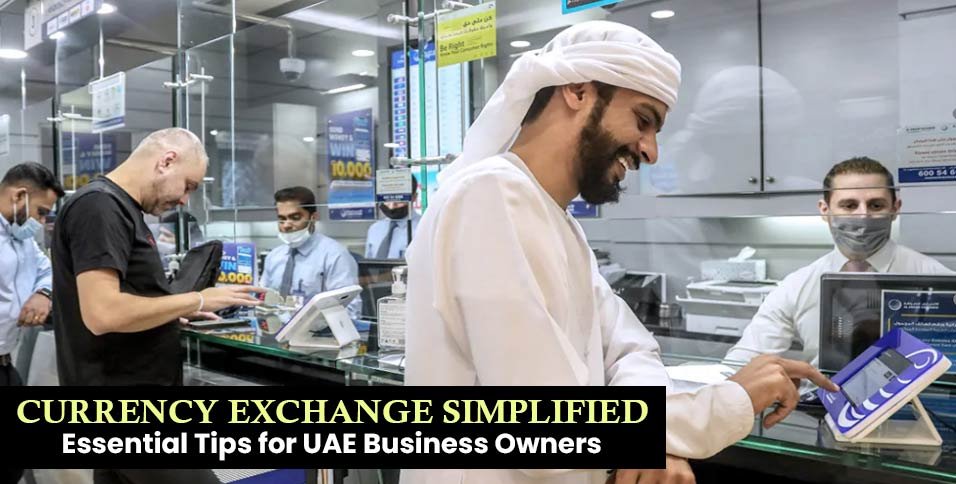In a dynamic business landscape like the United Arab Emirates (UAE), seizing growth opportunities often involves collaborating with overseas partners or tapping into global talent pools through outsourcing.
However, facilitating such collaborations requires navigating foreign exchange – a complex task for many business owners.
Dealing with exchange rates can be tough. It’s like a rollercoaster ride: unpredictable and sometimes costly, especially when it comes to business money transfers.
Moreover, small businesses feel the pinch more than big ones. They often end up paying higher fees. To prevent this from happening to you, this article dives into the five essential tips that can help UAE business owners make smarter financial decisions.
1. Choose the Right Currency for Business Transactions
When expanding internationally, businesses in the UAE encounter the complexity of foreign currency exchange. Calculating currency values can be time-consuming, adding to administrative burdens.
You can opt to conduct transactions in foreign currencies to streamline the process, reducing complexities and minimizing currency exchange fees. This is a good option if you can request prices from foreign suppliers in their local currency since it can yield cost savings and faster transactions.
However, currency fluctuations pose risks influenced by factors like political uncertainty, economic conditions, and trade deals. To navigate these challenges effectively, you can:
- Opt for global currencies for most transactions. This will serve as a middle ground between your own currency and your customers’ or international suppliers’.
- Consider liquidity and determine whether it is possible for you to sell the foreign currency at a later date.
If you send money abroad frequently, remember to monitor foreign exchange rates to ensure that you’re not losing money. Read the next section to learn more about exchange rates and fluctuations.
2. Understand Exchange Rates and Fluctuations
Exchange rates are the heartbeat of global commerce, driven by many factors. Financial institutions, investors, and speculators constantly buy and sell currencies, shaping the market exchange rate between nations.
Trade dynamics and geopolitical events influence the economic influx that triggers currency exchange fluctuations. For instance, the United States’ tariff announcement on Chinese imports caused a sharp market drop. This prompted China to lower the value of its currency, the yuan, to keep things stable.
These shifts affect countries worldwide, including the UAE.
For example, during the Russia-Ukraine conflict, the ripple effects caused the value of the UAE dirham to fluctuate. Fortunately, UAE businesses have smart strategies like currency hedging and spreading their money across different currencies to minimize such risks.
3. Look for Reliable Currency Exchange Services in the UAE
When seeking currency exchange services in the UAE, you must find a reliable provider tailored to your business needs.
Start by considering the costs of money transfer. Look for competitive exchange rates and low fees to avoid overpaying.
If speed is crucial for your business, opt for services that offer fast and efficient payment processing to prevent delays. Convenience matters, too, so choose providers that offer online or mobile app transfers for 24-hour accessibility, especially if your team operates across different time zones.
If your business requires frequent payments, prioritize companies that support automated transactions for efficiency. Lastly, ensure reliable customer support is available to assist you promptly if issues arise.
4. Manage Currency Risk With Hedging Strategies
To shield against currency risk, businesses can employ hedging strategies, which involve taking positions or using financial derivatives to offset potential losses from exchange rate fluctuations. This includes forward contracts and limit orders.
Here’s a quick summary of their pros and cons:
- Forward contracts secure exchange rates for future transactions to avoid any currency fluctuations. However, they lock businesses into the agreed rates, which means they are potentially missing out on favorable shifts in the market.
- Limit orders offer flexibility by allowing businesses to set target rates for transactions. While they guarantee fulfillment at or above the target rate, there’s a chance that the money won’t be sent if the exchange rates do not reach the set limit.
Both tools provide avenues for managing currency risk, allowing businesses to navigate volatile exchange markets with greater certainty and control. Just remember to weigh the pros and cons before employing these strategies.
5. Follow the Best Practices for International Payments
Currency exchange in the UAE involves several steps to ensure smooth transactions:
- Choose a reputable exchange service to guarantee fair rates and secure dealings.
- Stay updated on exchange rates using reliable financial sources.
- Provide valid identification as per regulations when exchanging currency.
- Specify the amount and currency type for exchange, and receive the equivalent amount in AED or vice versa, minus a nominal service fee.
- Always keep transaction receipts for reference.
As much as possible, exchange currency when the rates are favorable. If that’s not possible, you can always compare rates from several sources to get the best deal.
Avoid airport exchanges as most of them have less favorable rates. Instead, opt for city-based or online platforms.
Research reputable online options for competitive rates and secure transactions.
Currency Exchange Made Simple
Mastering currency exchange is crucial for UAE business owners. By applying these tips, you can confidently navigate the complexities of international transactions. Apply these tips to streamline your operations and maximize financial efficiency.
Also Read: Examining the Money Exchange APIs’ Dynamics: Using Technology to Simplify Currency Conversion















